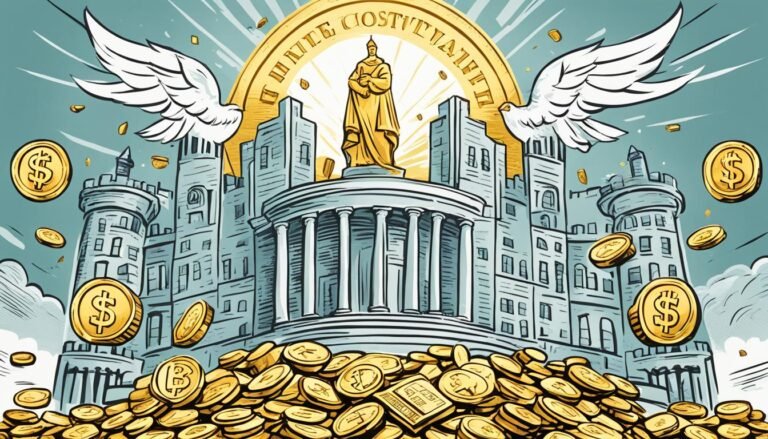Elite Tax Strategies: How the Wealthy Minimize Tax Liabilities
Did you know Peter Thiel, a big name in tech, made a $5 billion Roth IRA1? This move kept a lot of his income from taxes. It shows how the super-rich dodge taxes using smart moves.
Billionaires like Elon Musk and Jeff Bezos have huge wealth but pay little tax1. They use careful investments and trust funds to keep their money safe. This isn’t just about getting rich. It’s about staying rich by managing taxes well.
Ultra-rich people avoid selling stock to dodge capital gains tax. They might loan money using their stock as a guarantee1. Jeff Bezos and Elon Musk did this clever trick to pay less in taxes.
Steve Ballmer reduces his taxes by owning the Los Angeles Clippers1. This job gives him big tax deductions.
Real estate is a goldmine for tax breaks. Stephen Ross, a top real estate developer, skipped income taxes for 10 years. He did this by using specific tax breaks for the real estate industry1.
Tax tricks involve trust funds and special investments. They show a complex dance where the wealthy save on taxes. Knowing these tricks helps us see how elite financial advice makes a big difference. It’s also a call for making tax rules fairer for all.
Introduction to Elite Tax Strategies
Elite tax strategies help the rich pay fewer taxes, keeping and growing their money. According to ProPublica, these methods are not common knowledge and might include changing how income is seen. They could also mean using debt smartly to lower taxable income or avoid tax.
The Importance of Minimizing Tax Liabilities
By using these elite strategies, the wealthy can keep more of their money to invest or save. Peter Ristevski, also known as the “1% accountant” and “financial surgeon,” can help businesses keep 25 to 30% more of their money by reducing tax2. They do this by protecting their assets and using accounts in other countries to save on taxes3.
Why the Wealthy Focus on Tax Strategies
The rich pay a lot of attention to these strategies because they can decrease big tax bills. For example, Elon Musk and Jeff Bezos have lessened their taxes by borrowing against stock instead of selling, which is taxed more3. Due to how tricky federal tax laws can be, they also rely on experienced tax pros to find and use these strategies3. Thanks to this know-how, they can take advantage of offshore accounts and other legal structures to reduce taxes4.
The Ultra Wealth Effect: Borrowing Against Wealth
The “Ultra Wealth Effect” is a smart way for rich people to use their big stock holdings. They can get money by taking loans. This means they can keep their stocks and not pay taxes on the money they get this way1. It’s a great plan. They get to use the loans without paying taxes on them. So, they get to use their stocks’ value without losing money to taxes.
Stock Holdings and Tax Implications
Holding a lot of stocks affects taxes, especially when using them for loans. With loans, rich people can get cash now and deal with taxes later1. This way, they don’t pay as much tax as they would if they sold the stocks. They keep more of their money, showing how smart the very rich are with taxes5.
Using Loans as a Tax-Free Source of Funds
Borrowing money against stocks is a clever way for the wealthy to handle their finances. It lets them get cash without selling their investments and paying high taxes1. This method is like using advanced tax planning to keep their wealth untouched by taxes1.
Maximizing Retirement Accounts: The $5 Billion IRA
Roth IRAs help in estate planning by letting you grow your money tax-free. Peter Thiel’s use of his Roth IRA shows smart investments can lead to huge gains. The tech investor turned a $2,000 account into $5 billion in 20 years6.
How Peter Thiel Used a Roth IRA
In 1999, Thiel put cheap PayPal shares into his Roth IRA. They grew a lot over time because of the IRA’s tax benefits. This strategy turned a small amount into billions, highlighting how Roth IRAs can be good for long-term growth.
Strategies for Contributing Low-Valued Shares
It’s important to pick shares that are low in value now but could grow fast. This way, the IRA shields the big gains from taxes. Knowing the IRA’s contribution limits is key to maximizing your investment without penalties6. Also, for those making over $228,000, there’s a limit on direct contributions. You’d need to use other methods like a backdoor.
The focus has shifted from encouraging regular folks to save in IRAs to the rich using them for big investments. This trend shows how the wealthy navigate tax laws to protect and grow their wealth for generations to come.
The $1 Billion Parlor Trick: Converting High-Tax-Rate Income
Wealthy individuals use complex ways to change high-tax income into lower-taxed types. Jeff Yass from the Susquehanna International Group used these methods. He saved over $1 billion in taxes for six years by changing short-term trading gains into long-term ones. This made those earnings fall under lower tax rates1. Such tactics involve using tax code rules in unique and sometimes controversial ways.

Knowing about estate planning strategies and tax loopholes is key for the rich. By changing their income in these clever ways, they can manage their money better, sometimes storing it in tax havens. This not only lowers their taxes but also helps keep the wealth for their future families.
Real Estate and Oil Ventures as Tax Shelters
Investing in real estate and oil is smart for many ultra-wealthy people. They get to use special tax rules that let them lower how much taxes they have to pay. This is mainly because these investments often go down in value over time. And the law says they can count this loss against their profits, helping them keep more of their money.
Utilizing Depreciation in Real Estate
In real estate, the value of properties can decrease over time, which is called depreciation. Big investors, like Stephen Ross, use this to protect their income from taxes. This means they pay less tax for a while, helping them grow their wealth. They can do this by showing their properties are losing value, even if they might be making money another way.
Oil and Gas Industry Write-Offs
Oil and gas businesses provide great tax-saving chances too. After oil spills or other big losses, these businesses get tax breaks. These breaks are in place because the oil industry is risky, and big accidents can happen. And these benefits are not just in the U.S., they can help with taxes overseas too. This gives the ultra-rich even more ways to save on their taxes.
Using Trusts to Avoid Estate Taxes
Trusts are vital for rich individuals looking to cut down on estate taxes. They provide a safe way to pass down a lot of money over generations with less tax. By setting up different trust funds, families can keep more of their wealth from being taxed when they die.
The Role of Trusts in Estate
Trusts have many uses in making an estate plan, like lowering tax bills and keeping control over who gets what. Wealthy people can use options like Irrevocable Life Insurance Trusts (ILITs) or Spousal Lifetime Access Trusts (SLATs) to move much of their estate beyond taxes. This is done while ensuring their spouse and children still benefit7. For instance, Spousal Lifetime Access Trusts allow for both reducing taxes and keeping some flexibility. They let you take assets out of the estate without losing the ability to give to the spouse7.
Case Studies of Billionaire Trust Usage
Super-rich families are known for using complex estate plans to save their wealth. Take the Rockefellers, who hold onto an about $8.4 billion through trusts supported by life insurance7. Then there’s the Hearst Corporation, making over $10 billion a year. They share these earnings with more than 65 family members through a trust7. Trusts like these help manage and cut down on taxes, protecting the money for generations. By using these strategies, wealth managers can help their top clients gain an extra $367 million over 75 years through dynasty trusts. They show how important good estate planning is over time8.
Reports suggest that most of the nation’s top 100 wealthy people take advantage of trusts to pay fewer taxes1. This shows how trusts are widely trusted to protect a big estate. With the right trusts, these people make sure their wealth keeps serving their family even after they’re gone, all while avoiding big tax hits.
Claiming Deductions from Hobbies and Side Projects
People who turn hobbies and side projects into businesses can get big tax breaks. They set up these activities as businesses to use special tax rules and lower their taxes. This way, rich folks can change things they love into ways to save money on taxes. They might even protect their assets and use accounts in other countries to pay less in taxes.
Turning Hobbies into Business Deductions
Activities like horse racing or owning luxury hotels can offer major tax benefits. Folks can get big tax breaks by making these hobbies look like real businesses. Last year, at the Kentucky Derby, six people with racehorses got to slash $600 million off their taxes1. Owners of fancy hotels can also cut down their taxes by running them as businesses. This shows how turning interests into businesses can really help dodge taxes.
Examples from Horse Racing and Luxury Hotels
Big names like the Beanie Babies creator, Ty Warner, also benefit this way by owning luxury hotels. Treating these hobbies as businesses helps with keeping their assets safe and avoiding taxes. Even in horse racing, where profits can be low, these tax breaks can be huge. The super-rich are smart about using rules to keep more of their money through legal tax strategies and using accounts in other countries.
The Magic of Sports Ownership: Reporting Losses
Owning a sports franchise can be a smart move. It’s not just about making money. It’s also about saving on taxes. Take Steve Ballmer and the Los Angeles Clippers, for instance. Despite the team’s value going up, Ballmer can show big losses on paper.
This loss can help him pay less tax. Meanwhile, the actual team members and stadium workers pay more. It’s a clever tax trick that benefits the rich.
For instance, owners can deduct the costs of player contracts and team operations. They can then use these deductions to lower other taxable income. Jeff Yass turned over $1 billion in trading money into lower-taxed versions through such methods over six years.1
Team owners also do a lot for their communities. They invest heavily in making their image better through Corporate Social Responsibility (CSR) activities. This boosts their popularity, which in turn grows their business.
Richer sports teams also get involved in CSR more. They invest in fan and community-focused activities. This not only makes the community like them more but ultimately helps the team do better financially9.
This clever mix of owning a sports team and using tax strategies shows how the rich get richer. They get financial and social wins through their sports investments. It turns owning a sports franchise into a powerful and rewarding choice.
Changing Tax Laws to Reduce Liabilities
The richest individuals use tax loopholes and influence tax rules to lower their taxes. They shape policies through their donations, aiming to decrease what they owe. This is seen clearly in recent U.S. tax law changes.
The Impact of Political Contributions
Rich people’s political donations have changed tax laws significantly, like during Trump’s time as president. These changes, especially the tax cuts for certain businesses, saved the richest a lot of money. In fact, 82 top families got $1 billion from these new laws1.
Trump’s Tax Cuts for Passthrough Businesses
The tax cuts for passthrough businesses under Trump are a big example. Business owners could change how they reported their incomes, lowering what they owed. The tax rate for the wealthiest also dropped, from 39.6% to 37%10. This shows how big contributions can lead to tax policies that help the wealthy the most10.
Additionally, the maximum deduction for giving to charity went up from 50% to 60% of total income. This gave the wealthy another way to lower their taxes10. These changes show how money and tax rules are connected, letting the richest keep and increase their wealth often funded by taxpayers.
Source Links
- https://www.propublica.org/article/billionaires-tax-avoidance-techniques-irs-files
- https://fox40.com/business/press-releases/ein-presswire/714688872/peter-ristevski-revolutionizing-tax-minimization-and-asset-protection/
- https://financialpolicycouncil.org/wildcatting-in-the-oil-industry-vs-shielding-wealth-out-of-the-box-tax-strategies-for-young-entrepreneurs/
- https://www.asanet.org/wp-content/uploads/attach/journals/jun16asrfeature.pdf
- https://inequality.org/research/excessive-wealth-has-run-amok/
- https://nomadcapitalist.com/finance/how-to-create-a-roth-ira-like-peter-thiel/
- https://www.mizecpas.com/tax/estate-planning-insights-from-americas-wealthiest-families/
- https://www.vanhollen.senate.gov/news/press-releases/van-hollen-warren-sanders-whitehouse-urge-treasury-to-crack-down-on-ultra-wealthy-abuse-of-trusts-to-dodge-taxes-
- https://www.ship.edu/contentassets/569211b0c6f243808c3c64f54e816cd2/v1mcgowanp45-p82.pdf
- https://www.cnbc.com/2019/02/21/here-are-5-ways-the-super-rich-manage-to-pay-lower-taxes.html







